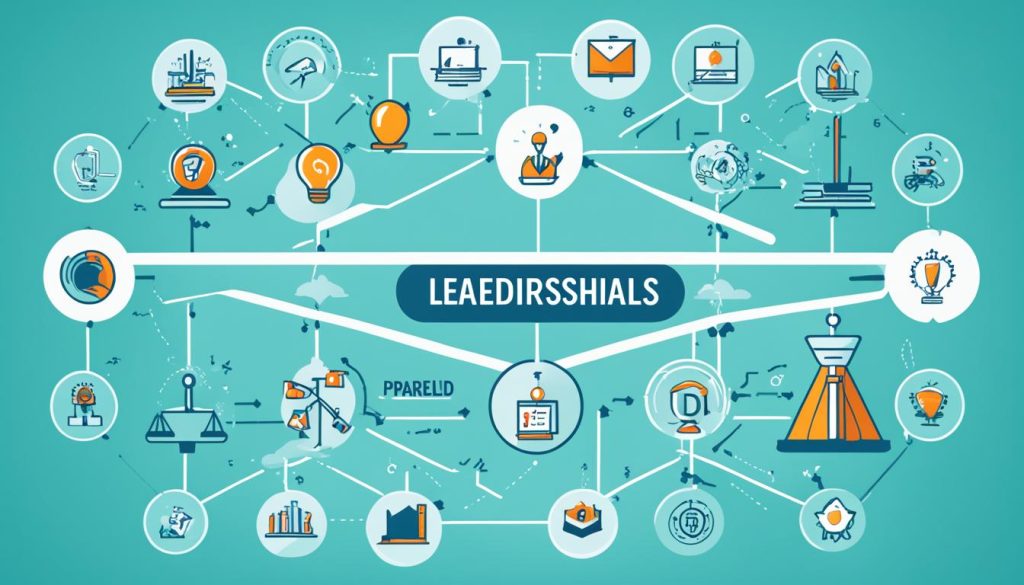Doctorate degrees in leadership are a crucial stepping stone for professionals seeking to address the leadership crisis and make a positive impact within organizations. According to the DDI Global Leadership Forecast 2023, the need for skilled leaders has never been more apparent. With only 40% of leaders reporting having high-quality leaders, and 72% feeling “used up” at the end of the day, there is a clear demand for individuals with the necessary skills and qualifications to excel in leadership roles.
A doctorate in organizational leadership is specifically designed to equip professionals with the essential tools and expertise needed to thrive in leadership positions and drive measurable outcomes in the workplace. By pursuing a doctorate degree in leadership, individuals can elevate their expertise and transform their vision into reality, creating thriving workplaces and driving organizational success.
Key Takeaways:
- Doctorate degrees in leadership are crucial for addressing the leadership crisis and making a positive impact in organizations.
- Only 40% of leaders report having high-quality leaders, highlighting the need for skilled leadership.
- A doctorate in organizational leadership equips professionals with the skills and tools needed to thrive in leadership roles.
- By pursuing a doctorate in leadership, professionals can elevate their expertise and drive organizational success.
What Is Organizational Leadership?
Organizational leadership is a management approach that prioritizes empowering individuals to achieve a shared goal or mission. Skilled organizational leaders apply leadership theories and best practices to create a positive work environment.
The DDI Global Leadership Forecast 2023 emphasizes the importance of meaningful leadership tasks, such as effective coaching, clear development paths, and objective assessments, which have a measurable positive impact in the workplace.
“Effective leadership is not about managing people, but about inspiring and guiding them towards a common vision.”
Doctorate degrees in leadership focus on developing innovative organizational leadership skills to address the leadership crisis and improve organizational success.
PhD vs. Ed.D. in Organizational Leadership
Professionals interested in a doctoral program in leadership have two options: a PhD or Ed.D. program. While both programs are rigorous and terminal degrees, they differ in their focus and career outcomes. A PhD in Organizational Leadership primarily prepares individuals for research and academic careers, while an Ed.D. program prepares professionals to apply leadership learnings in practical workplace settings.
The duration and coursework requirements also differ. Ed.D. programs typically take around three years and require approximately 60 hours of coursework. In contrast, PhD programs can take four to six years and entail around 90 hours of coursework.
Both degrees provide valuable knowledge and skills in organizational leadership, but the PhD focuses more on theoretical and research aspects, while the Ed.D. hones practical leadership competencies.

Enhancing Leadership Qualities through an Ed.D.
Soft skills, or leadership qualities, are crucial for effective leaders. An Ed.D. program in leadership focuses on developing and honing these qualities through coursework, interactions with faculty and classmates, and applicable projects. By engaging in a holistic approach to leadership, Ed.D. students are empowered to inspire change and have a maximum impact in their organizations.
During an Ed.D. program in leadership, students have the opportunity to cultivate various leadership qualities that are essential for success. These qualities include:
- Ethical leadership: Ed.D. students gain a deep understanding of ethical decision-making and learn to apply ethical principles in their leadership roles. This allows them to lead with integrity and earn the trust and respect of their teams.
- Professional collaboration: Collaboration skills are crucial for effective leadership. Through group projects and interactive discussions, Ed.D. students learn how to effectively collaborate with diverse teams, leverage their strengths, and achieve shared goals.
- Community engagement: Engaging with the community is an important aspect of leadership. Ed.D. programs provide opportunities for students to connect with local communities, understand their needs, and develop strategies to make a positive impact.
- Adaptability: In today’s rapidly changing world, leaders need to be adaptable and flexible. Ed.D. students learn how to navigate uncertainty, embrace change, and guide their organizations through challenging times.
- Cultural intelligence: Effective leaders value and respect diversity. Through coursework and experiential learning, Ed.D. students develop cultural intelligence, enabling them to lead diverse teams and create inclusive work environments.
- Decisiveness: Making informed decisions is a critical leadership skill. Ed.D. programs provide students with the tools and frameworks to analyze complex situations, gather relevant information, and make thoughtful decisions.
By focusing on the development of these leadership qualities, Ed.D. programs equip aspiring leaders with the skills and mindset needed to drive organizational success. The combination of theoretical knowledge, practical experience, and personal growth enables Ed.D. graduates to lead with confidence and make a positive impact in their chosen fields.
“Effective leadership is not just about a title or position; it’s about having the right qualities and skills to inspire and influence others. An Ed.D. program in leadership provides a transformative learning experience that enhances these qualities, allowing leaders to thrive in dynamic and challenging environments.”
To illustrate the impact of leadership qualities, consider the following example:

John, an Ed.D. student specializing in leadership, is passionate about creating an inclusive work culture in his organization. He actively engages with his classmates and faculty, learning from their experiences and perspectives. Through coursework and group projects, John hones his collaboration and cultural intelligence skills. He also immerses himself in community initiatives, organizing events that promote diversity and inclusion. Armed with his acquired leadership qualities, John emerges as a respected leader in his organization. His ability to foster collaboration, embrace diversity, and make ethical decisions inspires positive change and elevates the performance of his team.
By enhancing leadership qualities through an Ed.D. program in leadership, individuals like John are equipped with the tools and mindset to make a difference in their organizations and drive sustainable success.
Developing Skills through an Ed.D. in Leadership
Effective leaders possess a diverse skill set that includes competencies like leadership skills, change management, crisis response, employee development, coaching and mentoring, systems thinking, and research skills. An Ed.D. program in leadership equips professionals with these skills, allowing them to navigate change, manage crises, and prioritize employee growth.
Leadership skills are crucial in today’s ever-changing workplace. An Ed.D. program provides comprehensive training to develop these skills and enhance one’s ability to inspire and motivate others. Through courses such as organizational change management, strategic leadership, and team development, students gain the necessary knowledge and practical experience to lead effectively.
Change management is a critical skill for leaders as organizations continually evolve. Ed.D. students learn techniques and strategies to implement and sustain change, ensuring smooth transitions and positive outcomes. With this skill, leaders can guide their teams through periods of uncertainty and achieve long-term organizational goals.
As John Maxwell, a renowned leadership expert, once said, “Change is inevitable. Growth is optional.” An Ed.D. program helps leaders embrace change and turn it into an opportunity for personal and professional growth.
Furthermore, an Ed.D. program equips leaders with crisis response skills. Today’s fast-paced world is prone to unexpected challenges, and leaders must be prepared to handle crises effectively. By studying crisis management, leaders learn how to assess situations, make informed decisions, and lead their teams through difficult times.
Employee development is another key aspect of effective leadership. Ed.D. programs emphasize the importance of fostering a culture of continuous learning and growth within organizations. Through courses on talent management, performance evaluation, and coaching, leaders develop the skills necessary to nurture their employees’ potential and facilitate their professional development.
An Ed.D. program also focuses on equipping leaders with essential research skills. Leaders must be able to gather and analyze data to make informed decisions. Whether it’s conducting surveys, studying market trends, or evaluating organizational performance, research skills enable leaders to gather the necessary information to make strategic choices and drive positive change.

This image depicts a diverse group of professionals engaged in a collaborative discussion, highlighting the importance of employee development in leadership.
By developing a comprehensive skill set that encompasses leadership skills, change management, crisis response, employee development, and research skills, leaders who complete an Ed.D. program are better prepared to lead in today’s complex and ever-changing organizations. These skills enable leaders to navigate challenges, inspire their teams, and drive success.
Technology Integration in Leadership
Technology plays a significant role in leadership in the digital age. As leaders navigate the ever-evolving landscape of the modern workplace, it is crucial for them to embrace technology integration to stay ahead. A strong understanding of technology skills and its impact on organizations is essential for effective leadership in the digital era.
Leaders must commit to lifelong learning and stay updated on technological advancements to leverage their potential benefits. An Ed.D. program in leadership provides a comprehensive education that explores the impact of technology on organizations. Through this program, leaders gain the necessary skills to identify how technology can enhance their effectiveness and facilitate transparent communication.
“Technology integration is not about the tool, but how you use it to transform teaching and learning.”
Leaders who have the ability to integrate technology effectively can strategically set plans and policies that optimize its use. They understand that technology is not just a tool but a catalyst for innovation and growth. By embracing technology integration, leaders can enhance their leadership practices and create a digital-savvy workplace that aligns with the demands of the digital age.
With technology integration in leadership, organizations can streamline processes, enhance collaboration, and foster creativity. Leaders who possess a strong foundation in technology skills can harness the power of digital tools to drive organizational success and adapt to rapid changes in the business landscape.
Benefits of Technology Integration in Leadership:
- Improved efficiency and productivity
- Enhanced communication and collaboration
- Effective decision-making based on data analysis
- Better understanding of stakeholders’ needs and preferences
- Adaptability in response to technological advancements
- Creation of a culture of innovation and continuous improvement
Leaders who prioritize technology integration are better equipped to lead their teams through digital transformations, enabling their organizations to thrive in the digital age. By staying at the forefront of technology trends and continuously developing technology skills, leaders can navigate the complex challenges of the modern workplace and position their organizations for long-term success.

Careers and Opportunities with an Ed.D. in Organizational Leadership
Graduates of an Ed.D. program in organizational leadership are well-prepared for leadership roles in various sectors. The skills and qualities obtained through an Ed.D. program make graduates valuable assets in any industry, as skilled leaders are needed across all sectors.
Educational Leadership:
- K-12 School Leaders
- Postsecondary Administrators
- College Professors
Business Leadership:
- Corporate Trainers
- Chief Learning Officers
- HR Directors
Civic and Government Organizations:
- Education Policy Analysts
- Nonprofit Directors
Healthcare Leadership:
- Healthcare Organization Management
- Health Policy
- Health Research
Whether it’s shaping the minds of future generations, driving innovation in the corporate world, shaping public policy, or improving healthcare delivery, Ed.D. graduates have the opportunity to make a significant impact in their chosen field. With their specialized knowledge in organizational leadership, Ed.D. professionals are well-equipped to take on various leadership roles and excel in organizational leadership positions.

Conclusion
Doctorate degrees in leadership, such as an Ed.D. in organizational leadership, provide professionals with the necessary skills and qualities required for effective leadership. These comprehensive programs empower individuals to address the leadership crisis and make a positive impact in organizations. By pursuing a doctorate in leadership, professionals can enhance their expertise and turn their vision into reality, cultivating thriving workplaces and driving organizational success.
Leadership doctoral programs offer a holistic education that equips individuals with the tools needed to navigate complex challenges in today’s dynamic work environments. These programs develop crucial competencies such as change management, crisis response, employee development, coaching and mentoring, and research skills. Graduates of these programs are well-equipped for leadership roles across various sectors, including education, business, civic and government organizations, and healthcare.
For those aspiring to excel in leadership positions, leadership PhD programs offer a path to acquiring advanced knowledge and becoming thought leaders in the field. Through rigorous coursework and research, these programs prepare individuals for academic and research careers, contributing to the body of knowledge in organizational leadership. A doctorate degree in leadership not only enhances individual capabilities but also benefits organizations by fostering a culture of effective leadership and driving organizational success.




No comments! Be the first commenter?